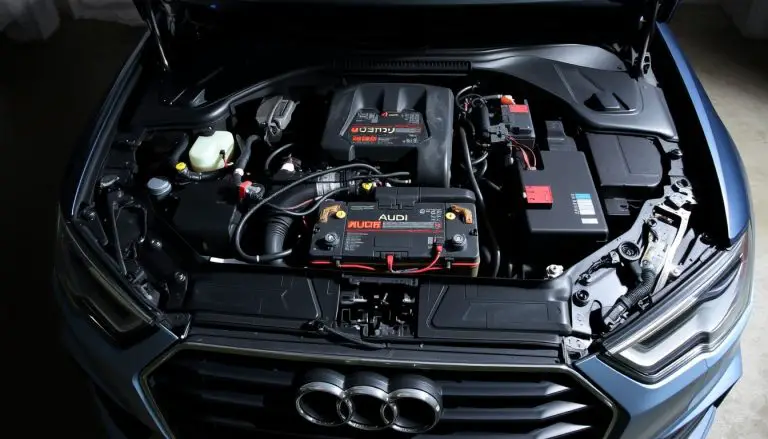For Audi owners, maintaining the integrity of their vehicle’s engine is paramount. One crucial aspect of this maintenance is the valve cover gasket replacement. Over time, the valve cover gasket can deteriorate, leading to leaks and potential engine damage.
Understanding the average costs and considerations involved in this replacement is essential for planning and budgeting. The process involves not just the cost of the gasket itself but also labor costs, which can vary depending on the mechanic and the location.
Key Takeaways
- The average cost of Audi valve cover gasket replacement can vary based on several factors.
- Labor costs play a significant role in the overall expense.
- Choosing a reputable mechanic is crucial for a successful replacement.
- Regular maintenance can help prevent future leaks and damage.
- Understanding the signs of a failing valve cover gasket can aid in early detection.
Understanding Valve Cover Gaskets in Audi Vehicles
Understanding the valve cover gasket’s function is essential for Audi owners to prevent engine issues. The valve cover gasket is a critical seal that prevents oil leaks and contamination, ensuring the engine runs smoothly.
Function and Purpose of Valve Cover Gaskets
The primary function of a valve cover gasket is to seal the valve cover to the engine cylinder head, preventing oil from escaping. This gasket plays a crucial role in maintaining the engine’s overall performance and preventing damage to other components. A faulty gasket can lead to oil leaks, reduced engine performance, and potentially costly repairs.
Common Materials Used in Audi Gaskets
Audi gaskets, including valve cover gaskets, are typically made from high-quality materials such as rubber, silicone, or a combination of both. These materials provide excellent durability and resistance to heat, oil, and other environmental factors. The use of premium materials ensures that the gasket remains effective over time, reducing the need for frequent replacements.
Signs of a Failing Valve Cover Gasket
Recognizing the signs of a malfunctioning valve cover gasket is crucial for maintaining your Audi’s engine health. A failing gasket can lead to various issues that, if left unchecked, may result in more severe engine damage.
Oil Leaks and Their Locations
One of the most common indicators of a failing valve cover gasket is oil leakage. Identifying the source and location of these leaks is essential for diagnosing the problem.
Identifying Oil Puddles and Stains
Look for oil puddles or stains around the valve cover area. These signs often indicate that the gasket is compromised.
Common Leak Points in Audi Engines
In Audi engines, common leak points include the valve cover gasket itself and the areas around the spark plugs. Regular inspection can help identify these issues early.
Engine Performance Issues
A failing valve cover gasket can also lead to engine performance issues. These may include decreased engine power, rough idling, or misfires.
Burning Oil Smell and Smoke
Another sign is the smell of burning oil or visible smoke emanating from the engine area. This is often a result of oil leaking onto hot engine components.
| Symptom | Description | Potential Consequence |
|---|---|---|
| Oil Leaks | Oil puddles or stains around the valve cover | Engine oil depletion, potential engine damage |
| Engine Performance Issues | Decreased power, rough idling, misfires | Reduced engine efficiency, potential engine failure |
| Burning Oil Smell/Smoke | Smell of burning oil or visible smoke | Engine damage, potential fire hazard |
Audi Valve Cover Gasket Replacement Cost Breakdown
Understanding the breakdown of costs for Audi valve cover gasket replacement is crucial for car owners. The total expense involves both parts and labor costs, which can vary significantly based on several factors.
Parts Pricing for Different Audi Models
The cost of parts for Audi valve cover gasket replacement can differ based on the model. For instance, models like the A4 and A6 have different pricing for their gaskets.
OEM vs. Aftermarket Gasket Options
When it comes to gasket options, car owners can choose between Original Equipment Manufacturer (OEM) and aftermarket parts. OEM parts are made by the same manufacturer as the original gasket and are generally more expensive. Aftermarket gaskets are produced by third-party companies and can offer a more affordable alternative.
Additional Parts Often Replaced Simultaneously
During a valve cover gasket replacement, other parts such as spark plugs and ignition coils may also need to be replaced. This can add to the overall cost but ensures the longevity and performance of the engine.
Labor Costs and Time Requirements
Labor costs are another significant factor in the total cost of valve cover gasket replacement. The time required for the job can vary based on the mechanic’s experience and the complexity of the engine.
| Audi Model | OEM Gasket Cost | Aftermarket Gasket Cost | Labor Cost |
|---|---|---|---|
| A4 | $150-$250 | $50-$150 | $500-$700 |
| A6 | $200-$350 | $70-$200 | $600-$900 |
Cost Variations Across Audi Models
Valve cover gasket replacement costs for Audi vehicles are influenced by the specific model, among other factors. The diversity in Audi’s lineup means that owners of different models may face varying expenses when it comes to replacing this critical component.
A4 and A3 Series Costs
The Audi A4 and A3 series are among the most popular models. For these vehicles, the cost of replacing a valve cover gasket can range from $300 to $600, depending on whether you opt for OEM parts and the labor rates of the repair shop.
A6, A7, and A8 Series Costs
For larger and more luxurious models like the A6, A7, and A8, the replacement cost can be higher, typically falling in the range of $500 to $900. The complexity of the engine and the higher cost of parts contribute to this increased expense.
Q-Series SUV Costs
Audi’s Q-series SUVs, known for their robust performance and spacious interiors, also have varying valve cover gasket replacement costs. For these models, owners can expect to pay between $400 and $800.
| Audi Model | Cost Range |
|---|---|
| A3, A4 Series | $300 – $600 |
| A6, A7, A8 Series | $500 – $900 |
| Q-Series SUVs | $400 – $800 |
It’s essential for Audi owners to consult with a trusted mechanic or dealership to get a more accurate estimate based on their vehicle’s specific needs and condition.

Dealership vs. Independent Shop Pricing
The decision to use a dealership or independent shop for Audi valve cover gasket replacement can have a substantial impact on your wallet. When considering where to take your vehicle for service, it’s essential to weigh the pros and cons of each option.
Pros and Cons of Dealership Service
Dealerships offer several advantages, including the use of genuine parts and specialized training for their technicians. However, these benefits come at a cost.
Warranty Considerations
One significant advantage of using a dealership is that they typically honor the manufacturer’s warranty, providing peace of mind for Audi owners. This can be particularly important if your vehicle is still under warranty.
Technician Expertise and Equipment
Dealership technicians are often factory-trained and have access to the latest diagnostic equipment, ensuring that repairs are done correctly and efficiently. This expertise can be a significant factor in the quality of the replacement.
Finding Reputable Independent Mechanics
Independent shops can offer competitive pricing and personalized service, making them an attractive alternative to dealerships. To find a reliable independent mechanic, look for shops with good reputations and reviews from other Audi owners.
DIY Replacement Considerations
DIY enthusiasts can successfully replace the valve cover gasket on their Audi by understanding the process and potential pitfalls. This task requires careful planning, the right tools, and a clear understanding of the steps involved.

Tools and Materials Required
To start the DIY valve cover gasket replacement, you’ll need specific tools and materials. These typically include a new valve cover gasket, RTV sealant, and various hand tools such as socket wrenches and Torx drivers. Ensure you have a repair manual specific to your Audi model for detailed instructions.
Step Overview and Difficulty Assessment
The process involves removing the old gasket, cleaning the valve cover and cylinder head surfaces, and installing the new gasket. It’s essential to assess the difficulty level based on your mechanical experience and the specific requirements of your Audi model. Generally, this task is considered moderately challenging.
Potential Pitfalls and Warnings
Several potential pitfalls can complicate the DIY valve cover gasket replacement. These include damaging the valve cover or surrounding components during removal, improper sealing leading to leaks, and incorrect torque specifications. Being aware of these risks can help you take necessary precautions.
Common DIY Mistakes
Common mistakes include not properly cleaning the mating surfaces, over-tightening or under-tightening the bolts, and failing to replace damaged or worn-out components. Avoiding these mistakes requires patience and attention to detail.
When to Seek Professional Help
If you encounter unexpected complications or feel uncertain about any aspect of the replacement process, it’s advisable to seek professional help. A certified mechanic can provide the necessary expertise to complete the job correctly and efficiently.
Preventative Maintenance and Gasket Longevity
Preventative maintenance plays a significant role in extending the life of your Audi’s valve cover gasket. By adopting a proactive approach to engine care, you can significantly reduce the risk of gasket failure and associated repair costs.
Regular Oil Change Impact on Gasket Life
Regular oil changes are crucial for maintaining the health of your Audi’s engine and valve cover gasket. Fresh oil helps to lubricate engine components, reduce friction, and prevent the buildup of debris that can compromise gasket integrity. It’s recommended to check your owner’s manual for the manufacturer’s suggested oil change interval. For instance, you can find high-quality oil filters on eBay that are compatible with Audi models.
Some key benefits of regular oil changes include:
- Reduced engine wear and tear
- Prevention of sludge buildup
- Enhanced fuel efficiency
Engine Temperature Management
Proper engine temperature management is another critical aspect of preventative maintenance. Operating your Audi within the recommended temperature range helps to prevent excessive stress on the valve cover gasket. Ensure your cooling system is functioning correctly, and address any issues promptly to maintain optimal engine temperature.
By focusing on preventative maintenance, including regular oil changes and engine temperature management, you can significantly extend the life of your Audi’s valve cover gasket and maintain overall engine health.
Conclusion
Replacing the valve cover gasket in your Audi is a crucial maintenance task that requires careful consideration of various costs and factors. Throughout this article, we’ve explored the signs of a failing valve cover gasket, the average replacement costs, and the differences in pricing across various Audi models.
Understanding the cost considerations for Audi valve cover gasket replacement is essential for budgeting and ensuring your vehicle receives the necessary care. Whether you opt for a dealership or an independent shop, being informed about the parts and labor costs can help you make a more informed decision.
Regular maintenance, such as timely oil changes and proper engine temperature management, plays a significant role in prolonging the life of your Audi’s valve cover gasket. By staying proactive, you can avoid costly repairs and ensure your vehicle continues to run smoothly.
FAQ
What is the average cost of replacing a valve cover gasket in an Audi?
The average cost can range from 0 to 0, depending on the model, labor costs, and whether OEM or aftermarket parts are used.
How long does it take to replace a valve cover gasket in an Audi?
The replacement time can vary, but it typically takes between 2 to 4 hours, depending on the complexity of the job and the mechanic’s experience.
Can I replace the valve cover gasket myself?
Yes, it’s possible to replace the valve cover gasket yourself if you have the necessary tools and mechanical knowledge. However, it’s recommended to seek professional help if you’re unsure.
What are the signs of a failing valve cover gasket in an Audi?
Common signs include oil leaks, engine performance issues, and a burning oil smell. If you notice any of these symptoms, it’s essential to inspect the valve cover gasket.
How often should I change my Audi’s oil to maintain the valve cover gasket’s health?
Regular oil changes, typically every 5,000 to 7,500 miles, can help extend the life of the valve cover gasket and overall engine health.
Are there any differences in cost between OEM and aftermarket valve cover gaskets for Audi?
Yes, OEM gaskets are generally more expensive than aftermarket options, but they offer guaranteed compatibility and quality.
Can a faulty valve cover gasket cause damage to other engine components?
Yes, if left unrepaired, a leaking valve cover gasket can lead to oil leaks, which may damage other engine components, such as spark plugs and electrical systems.
Is it necessary to replace other parts when replacing the valve cover gasket?
It’s not always necessary, but other parts like spark plugs or seals might need replacement simultaneously, depending on their condition and age.
How does engine temperature management impact valve cover gasket longevity?
Proper engine temperature management can help extend the life of the valve cover gasket by reducing the risk of overheating, which can cause gasket degradation.
Can I drive my Audi with a leaking valve cover gasket?
While it’s possible to drive with a leaking valve cover gasket, it’s not recommended, as it can lead to further engine damage and potentially cause safety issues.


